the Boomerang







If you are reading this, you have survived the second General Assembly of the year – Congratulations! Scraps of fact and fiction regarding discount tabs at the bar and tensions between the BarCo and the UCSA board had been floating around campus, and the issue was made part of a GA to solve it once and for all. But what happened?
What exactly was the issue? What arguments did both boards have? Or was this simply about taking shots at the bar? No worries, the Boomerang plunged into UCU politics and did some investigating.
How objective is grading at UCU?
Klementina RistovskaWith discussion-heavy classes of 28 or less, it is only normal that professors at UCU often get to know their students well. At the same time, full name is required on student work in almost all courses. While blind grading is strictly enforced in Anglo-American universities, UCU does not seem concerned over the issue of potential bias. Does the lack of anonymous student assessment in our small college affect the fairness of grading? The Boomerang asked professors’ opinions on how objective is grading at UCU.
The first time I wrote an exam at UCU, I responsibly put down my student number on every page before I submitted my work. Glancing at my paper, the professor called after me: “Hey, you forgot to write your name!” Semesters later, I am still perplexed by the fact that in all the classes I take, from math assignments to short-essay exams, everything is graded within the context of who wrote it.
(Continued on page 06)
Discount tabs are not mentioned in the official UCSA documents, the Statutes and the Policy Manual, which makes the matter a proverbial grey area. “Discounts evolved as a tradition, but are not formally part of the Association,” UCSA Chair Noam Auerbach says. Traditionally, BarCo Board members get a full discount on all bar products. A few years ago, the UCSA Board was given a partial discount and this year, the same discount was extended to ASC.
Upon being elected, the new UCSA Board evaluated the concept of discount tabs and decided that they should have the same discount as the BarCo Board. They provide three main reasons for this.

Firstly, full discount tabs would increase the Board’s visibility on campus. “We need to encourage the Board to be in the bar and be a part of social life on campus,” Auerbach says. According to him, each Board member spends a few hours there on one night a week, giving them a presence score of six out of seven. But how many of us go to the bar once a week and pay full price?
Secondly, Auerbach wants to use discount tabs to reward people who work hard for the Association. This includes the BarCo Board, but also the UCSA Board.
The third and main argument is related to the structure of organizations in general. “You don’t see it in any organization that bodies
lower in the hierarchy are rewarded to a larger extent than those on top because those on top do more for the Association,” Auerbach says. “The people that have the final responsibility over decisions need to have the final say in them.” This is important for keeping the structure of how things work clear. Here, the main objective of the UCSA should be considered, specified in the Statutes (Art. 3.1): representing the interests of all members. So, is it in the members’ interest to model the UCSA as much after a real-world organization as possible, and is this truly what works best in our microcosm?
(Continued on page 06)
returned
Ivo
DimitrovThree fantastic years and you’re out. Everyone knows the deal from the moment they catch a first glimpse of College Hall. But what if there’s a way to cheat the system? Can you come back to this magical place? The Boomerang talked to alumni who did the impossible: they returned to UCU.
Kate Kirk, Anthropology professor and tutor, Class of 2002 ½, doesn’t shy away from revealing her UCU past. Looking over campus from her office in Newton, she recalls living in Locke, writing psychology essays, and debating with fellow students. “I met the two loves of my life here: my husband and Anthropology,” she says. “I was the girl who went running all the time. One day he asked me to run together. And here we are, ten years later.”
She admits to going through several phases here. Initially a studious shadow person, she then started to appreciate the social aspects of campus life more. “I might have even learned more outside of the classroom. You build a deep connection with a diverse group of friends. You will always share a common experience and a certain interest in the world. You stay close even after graduation.” says Kirk. The safe and comfortable environment of UCU was the reason she submitted her CV here years later, while working on her PhD.
The same sentiment is shared by Hinze Hogendoorn, who came back to teach after finishing his PhD in Cognitive Neuroscience. “Returning here was a logical choice. I have always appreciated the close relation between students and professors, and now that I teach, even more.” Like many students today, he came
here in 2001 without a clear direction and soon found his passion. He describes himself as a diligent and hard-working student, reaffirming the image we UCU’ers radiate to others.
Sebastian Cassé, Class of 2003, remembers spending a lot of time at the bar, in typical UCU fashion. Nowadays he prefers his office in College Hall, where he works as an information manager for the college. While studying here, he never gave much thought about his academic goals. Instead, he focused on campus involvement, DJ-ing in the bar twice a week and setting up a film club. Later he continued his education in media and film studies, but ultimately got involved in UCU again through a friend. “The environment is fun and working here is very rewarding. I feel I make a difference in the students’ lives,” says Cassé. “I never wake up wishing this wasn’t my job.”
But have the college and its students changed over the years? Cassé seems to think so. Ten years ago, coming here was a risk, as no one could estimate the value of the diploma. Now that UCU has built a reputation, the choice is much safer. “Students used to be quite alternative, now they are much more focused. B+ is just not good enough anymore.” Kirk agrees on the pioneering and entrepreneurial spirit in her time. Nowadays she sees a much bigger investment in the community. “There was nothing when I came here – not even the bar.”
UCU continues to affect the alumni’s lives and they all recognize the value of this experience. “The most important thing that I learned on campus is respect for and understanding of difference, and I hope that we impart that on students in our classes as well,” says Annemarie van Geel, who graduated in 2003. She went on to become a Middle East specialist and has been teaching a class on the Arab-Israeli conflict for the past five years. Kirk describes her UCU time as profound and very formative, but stresses that it is different for everyone. “The lack of anonymity and the amount of pressure are the downside of living in a close community. But for me it was exactly the right place. I thrived here.”

In the end, even the second round of UCU has an expiration date, especially in the case of Kirk. In January, she will start working at the Vrije Universiteit Amsterdam to research Indian immigration. She feels this is the only way to continue developing and broadening her knowledge. And just like her, all of us will have to find the courage to leave at some point (or get kicked out). No matter how much we feel connected to this place, you know there will be a time to move on and leave forever. Unless you come back to teach.
Some things get better with age: wine, cheese, and, above all, sex.
Studying at UCU is, in my opinion, one of these. I don’t mean to say that older students have more fun. I have no way of assessing this, as I can only be one age at a time. I also don’t mean that studying here gets better as UCU itself ages – I am only here at this moment, not five years ago or seven years from now. So let’s just assume that life at UCU improves with every year we spend here.
Last year, we were like scared little dogs that had been dropped into a compound full of big dogs, not knowing who to wag our tails at and who to run from. Now, I’m one of the medium-sized dogs. I know the place – not inside-out, but well enough.
After an initial phase of wanting to do everything, most of us have decided which committees and activities are worth our time and efforts. Sure, it’s probably
only twenty percent of what we signed up for during Introweek, but back then we didn’t know how precious time is at UCU.
Then there are the friendships, which actually deserve that name after a year of getting to know each other 24/7. We still meet new people, but the general weeding out of whom we want to spend time with and whom we only say hello to is done. If you’re lucky, you’re even living with your best friends and hopefully not regretting it.
We’re also a year – or seven dog years –older and wiser. Not just any year, but a year packed with experiences, mistakes we may or may not make again, things we’ve learned –in and out of the classroom. If things went as planned, we’re more mature, and our decisions are based on what we want rather than peer pressure. Plus, getting it your way is just more fun than following the crowd anyways.
Academics get better in time, too. Higherlevel classes are more focused and taken by students who are genuinely interested in the topic,
which tends to lead to interesting discussions and challenges to do better and try harder. Sure, being more focused on the future can be scary – thinking that you should research Master’s degrees instead of procrastinating – but we’re here because we want to move forward. Let’s hope this feeling applies to the third year as well, with the thesis looming and all that...
The main thing is probably practice: we get better at being here, at doing the work, handling the stress, finding the balance, actually taking a minute to enjoy where we are in life. Exam weeks still have us raiding the vending machines and pulling all-nighters, but we have survived them before, and we know we can do it again.
We know we’ll be just fine.
Oh, and one last thing: the new puppies, running and wagging their tails, are an unexpected but welcome source of entertainment.
Every Open Mic Night again, I realize how much I love campus. The smell, the talent and most of all, the people. Sitting in the bar, watching the audience, listening to the girl that dedicates a song to her brother –it’s not just them, it’s as if we’re all family. That’s great: it’s what makes campus special.
Nevertheless, being family doesn’t necessarily make things easier. Remember when you were a kid and you had that cool cousin who would always take your side against the grown-ups? Then he grew up and suddenly he seemed to conspire with the adults. And why do those older people have so much power?
It becomes even harder when the family is also a town, a school and an association. Arguments over class assignments and committee budgets easily turn into personal conflicts, which can make campus life a bit grim – although then there’s always the grandparents taking the kids for a drink.
Could campus really be a town though? Politically, things would be very peculiar. The citizens pay thousands of euros to a non-elected government. Additionally, there is an elected town council to represent the citizens in front of the government. However, the council gets a substantial part of their income from this same government. As such,
they have no choice but to be diplomatic.
Usually, except maybe in a one-billion-people country, none of this really matters: there is always independent journalism to shed light on the obscure matters. In this town, however, the council owns the newspapers.
When the All Students Interest Council (ASIC) decided to abolish itself a few years ago, people feared campus would lack an independent student representation. I think that is a very valid concern. We are more than a town, and that’s why we need leaders who know that people are more than the conflicts they cause.
Campus politics will always be wobbly. But you know what’s cool about being a family? We can work it out, every time again.
wobbly
I never wake up wishing this wasn’t my job
There was nothing when I came here - not even the bar
Three times a week, eight hours of practice, plus a match: playing top sports in the top team is a time-consuming hobby. How can this be combined with UCU-life? First year Zoë van den Brink, a volleyball fanatic, makes sure it’s possible.
After the last class at 17:30, she races to the station to catch the first train to Houten, where her club Taurus is located. Every weekend she travels through the country to play a match against one of the 13 teams on her level (the topdivisie). Although she was afraid at first that she would run behind on academic and social matters, she has now found friends who accept that she cannot always join them. Doing absolutely nothing, though, is not a possibility in her life.
After moving to the U.S. at the age of twelve, Zoë started playing volleyball at school as a way of meeting new people. She was soon spotted as a talented player and invited to a tryout for the travel team, the highest team of the region, of the Metro American Volleyball Club (Washington, D.C.). During these years she learned a lot. She had to prove herself again every year and travel all around the country for tournaments. She also discovered her strong points, being tall

and left handed, and her favorite position in the field: in the front, attacking and blocking.
In America sports are much more important than here. This is partly because students are eligible for scholarships: playing sports at a high level gets you a paid-for education. But Zoë preferred a high academic level and came to UCU. She found a volleyball club in Houten, where she could almost immediately join the top team.
Zoë needed to adjust to the differences between the two teams. In the U.S., when someone from the team would have problems or irritations show up during the training, they would keep this to themselves. The players here confront each other immediately. The directness is something new to her, although she does think it contributes to the team spirit. A bit of both extremes.
When I ask her about her favorite aspect of playing volleyball, Zoë starts beaming. “I love the moment when I smash a ball and score a point at a crucial moment in the game, or when I block a ball straight to the ground that my arms start shaking. These are the moments I am playing for.”
She also appreciates volleyball being “the most democratic sport there is”. The bond and communication within the team are so im-
portant that the team-working skills help her in her daily life too. She will always sacrifice her place in the field for a better player, because winning is always the most important.
Her ultimate dream? “I am not going to say that I dream of playing for the Dutch national team, although that will always be in the back of my mind”, Zoë says, “because I am just playing for fun. But I do want to keep playing as long as possible at my highest level.”
Hopefully, by now the UCSRN is a familiar word to you. The University College Student Representatives Netherlands consists of two students from each Dutch University College: one member from its non-academic association, and one member from its academic council. AAO Social Sciences Linda Barry represents the academic side of UCU. “At the moment, about half of the time I put in ASC is invested in the UCSRN,” Linda says. Since so much time is devoted to it, what are the benefits of UCSRN to ASC?
Linda explains the UCSRN has two main tasks. First, UCSRN wants to bring together University College students in the Netherlands. “Each UC is different, but we share the Liberal Arts and Sciences philosophy,” Linda says. Second, the UCSRN provides an opportunity for all UCs to represent themselves towards the outside world, for example by promoting the UCs to prospective students.
Lisa ten Brinke
Agroup of guys doing push-ups on a dusky football pitch, wearing pyjamas and witty nametags, others hobbling through Dining Hall covered in mud and hair gel: everyone has witnessed campus initiations. But there is also a rather unknown world of fraternities and sororities outside of campus. Some UCU students join these as well, but most others know little about them. Why do people leave the bubble to join these groups?
“I thought it would be nice to have a place off-campus where I could go, just to leave UCU for a while,” Willem Mouton, member of both Equites and the off-campus USC, says. “I think you’re missing something when you’re purely focused on campus, because you’ll only meet people with the same mindset and motivation.”
Diba Mokhberolsafa, who joined both Allure and the off-campus UVSV, agrees: “At UCU, many conversations are academically orientated, something I’m not that much into,
so it’s nice to get out every once in a while.”
But what makes off-campus fraternity life special? Dries de Jager, member of the offcampus Unitas, explains: “I guess it has to do with the Dutch down-to-earth mindset, something I believe cannot be found on campus.” Their history also makes them unique.
Lizz Fellinger, member of Luna and UVSV, adds: “Luna has only existed for 10 years and is still creating traditions, while UVSV has been there for more than a hundred years.”
Unfortunately, having a busy off-campus life is not always easy. Diba got reactions of criticism: “People called me crazy; they said it’s impossible to join both Allure and UVSV, while they completely accept people being in multiple on-campus boards.” Willem faced criticism as well: “UCU found it unacceptable that I had to miss part of Introweek because of my off-campus initiation, but I believe it should be everyone’s own choice.”
Time-wise, off-campus student life can be challenging, too. “I just joined Unitas, so I’m really busy at the moment, but I’ll find
a balance over time.” Dries says. But Diba, who joined UVSV last year, still struggles with this: “It’s difficult when I have to cancel things, because I’m afraid that I’ll disappoint people. I simply cannot join my jaarclub (group of friends from the same year) every night for drinks because of my UCU work.”
Lizz also mentions sacrifices she had to make: “I sometimes think it’s a pity I don’t have time for a UCU board position for example, but I made the choices that suited me best. For others, UCU life might offer exactly the things that they like.”
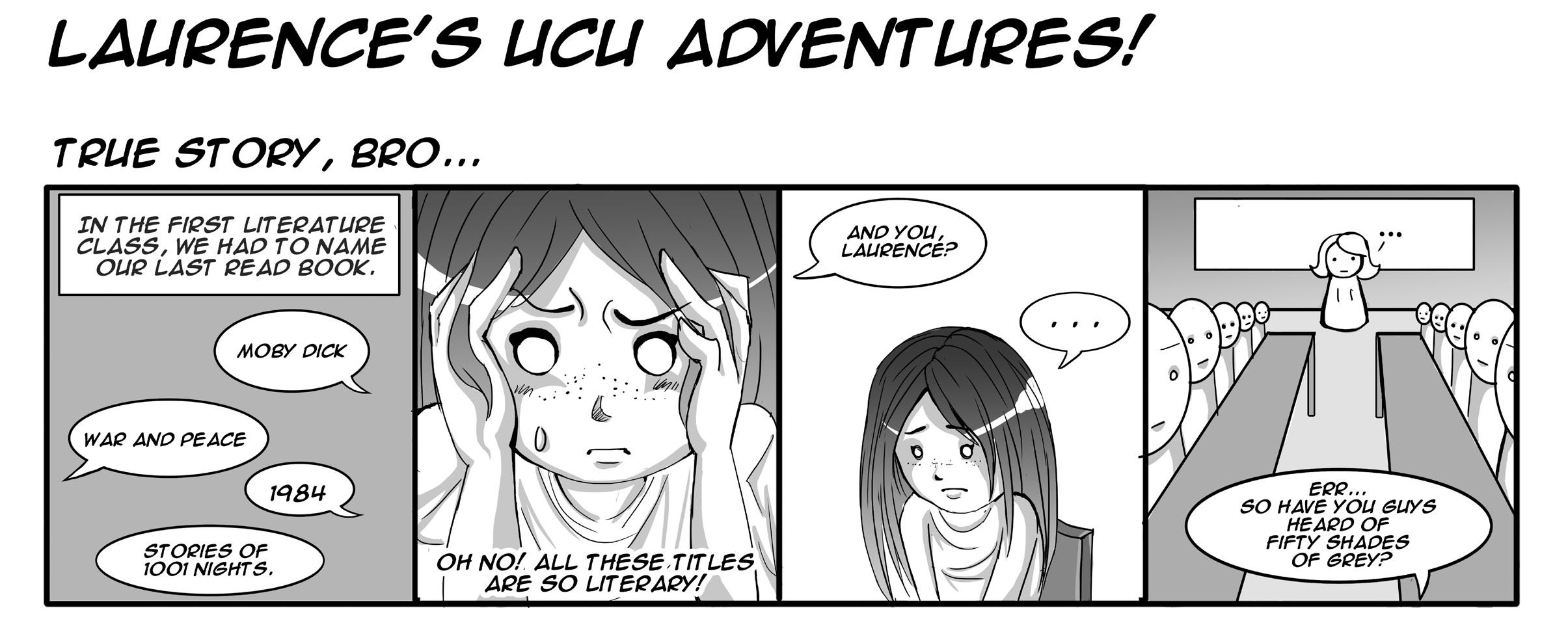
All agree that despite their full schedules, gaps in UCU life, and difficult choices, off-campus life adds a lot to their student experience: they got to know the city of Utrecht, new people with a different outlook and a special student culture. Willem “would recommend getting the best of both worlds. That’s at least what I always try to do.”
There are several UCs in which the association and the council are part of the same body. The UCSRN tries to make a distinction between academics and nonacademics. “At the same time, it is very much in the nature of UCs to integrate the two with each other, which is why we have one big UCSRN” Linda remarks. Still, the two main tasks don’t directly seem to contribute to UCU adacemics.
For ASC, there are two relevant aspects of the UCSRN. If we want to represent University Colleges towards bigger bodies, for example when government introduces higher education reforms, we need to unite in order to be heard. Especially because UCs have a different structure and different requirements than other bachelor programme’s in the Netherlands, representing our interests through an overarching body is crucial.
What is also very important is the constant sharing of information amongst members of the UCSRN. “Whenever we encounter a problem, we ask the other UCs whether they also experienced this and how they dealt with it,” Linda says. “For example, when ASIC changed into ASC two years ago, we took inspiration from AAC, the academic council of Roosevelt Academy in Middelburg.” She admits that this is not very visible for students. However, ASC constantly tries to improve academic matters, and “sharing information, knowledge and experiences helps us take better decisions, from which students benefit in the end,” Linda says.
Even though few amongst us are aware of this, the UCSRN promises to be a useful body for communication purposes. In 2012, it is an illusion that we can do everything on our own. Especially association board members and members of the councils profit from UC representation both on macro and micro-level, and the exchange of information. This is not only a justification of Linda’s time investment in an unbeknown student body. Moreover, it is an important step in the maturation of Liberal Arts and Science education in the Netherlands.
When it comes to fall break plans, a few things come to mind. ‘Going home’ or ‘hitchhiking’ are the usual answers you’ll get. ‘Going to Ethiopia’ however is definitely not the expected answer, nor the easiest to explain.
Pushed forward by the ‘unauthorised departure’ of two Ethiopian exchange students studying at UC last semester, the Dean asked EunA Jo and myself (both board members of the on-campus NGO UCWorld) to go to Ethiopia. Our task was, in the Dean’s words, to “open doors” with Wollega University – our sister college in Nekemte, Ethiopia.
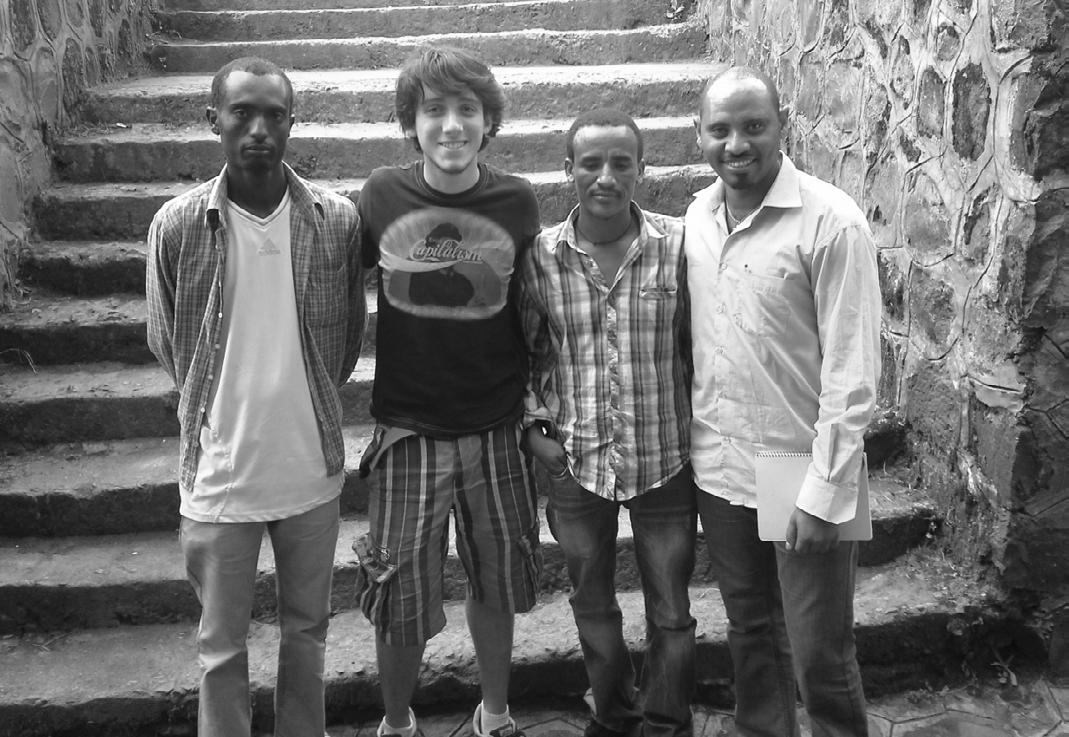
We arrived in Addis Ababa on the first Sunday of the fall break, not knowing what to expect. We went to our hotel by taxi and embarked on the ten hour journey (on the bumpiest road I have ever seen) to the university. When we arrived, we realised that this university had performed something of a miracle. In its five year existence, the university had gone from a student population of around 1,000 to around 18,000.
The campus is a sea of construction and renovation, with new libraries and dormitories springing across the immense area, and students hopping over a mix of cobblestone and dirt paths to get to their classes. In this campus, where six students
University College Alumni Association project Fall Break to your Future passed most of us by. So what exactly is this project about and how successful was it?
The project aims to connect UCU students and alumni. Students interested in certain masters or universities are paired with UCU alumni already studying there, so they can visit and check it out first-hand. The demand for UK destinations is the highest, but students can also go to places like Berlin and Pennsylvania.
If you missed it, you are not alone. According to the pro-
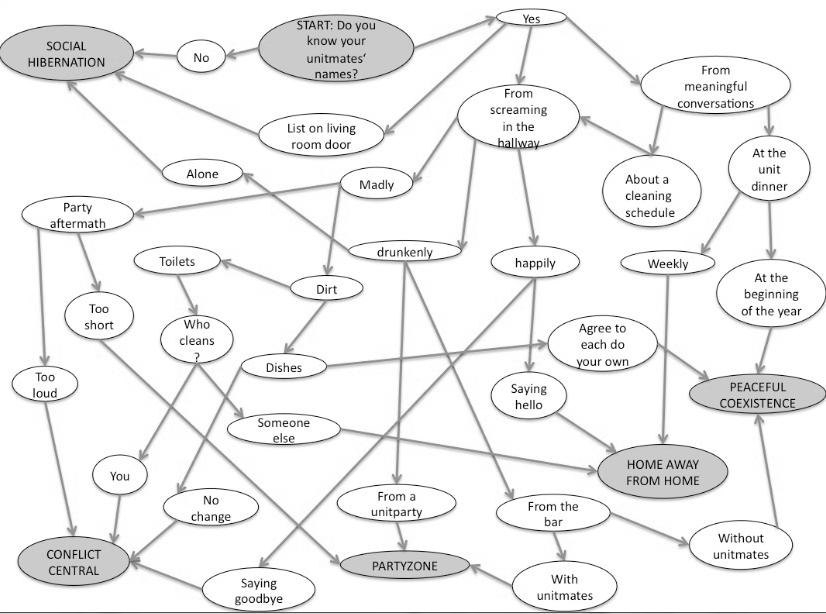 Sofia Banzhoff and Katharina Luckner
Sofia Banzhoff and Katharina Luckner
Find out what kind of unit you live in
share a Kromhout-sized room and receive eight Birr (€0.35) per day for food from the government, a miracle of education is being built.
But like many educational institutions, Wollega University is plagued by problems. There are 10 computers connected to the internet, while a further 100 sit unused under blankets. Students don’t know how to use the computers, so writing a research paper for example means paying someone else to type it. Not exactly an affordable expense. Classes are taught in English, but the level of English of both teachers and students is far from sufficient for an English-speaking job. Also, the pre-university education level of the female students is far below that of the male students.
The same problems are reflected in the other two university campuses in Gimbi and Shambu. A lot needs to happen, and that is where UCU comes in. We do have the resources to offer help and the students of this delegation were tasked to find out how we could fill the gap. Wollega University is an institution determined to keep growing and improving, with a dedicated student union (with which we spent hours of meetings) and a devoted student body. Together, our help can go a
very long way.
Nestled in the green hills of Ethiopia, Wollega University is single-mindedly moving forward on their path. The opportunity for both EunA and I to aid in this process was (not to be overly-dramatic) priceless. The recommendations of the delegation have been given to the Dean, and our job has been done. But keep an eye out for Wollega University, you’ll certainly be hearing a lot more about them in the months to come. 500 words is definitely not enough to talk about it.
ject’s founding father and UCAA Events Coordinator Roeland van Beek, some 20 people responded to their September email announcing the project. “15 wanted to know more and seven or eight actually wanted to participate,” he says.
Van Beek thinks the turnout was so low because people were unaware of the project in time. “People didn’t know there would be such an event and as such they didn’t count on it,” he says. “They might have to get used to it first.”
Also, everything was organised within a very short timeframe. “I didn’t know where I would be able to go at the time I had to decide, so I cancelled,” second year Charlotte Jergitsch says.
Van Beek received much positive feedback and called the project a success, although only two students participated. He recognized that there is room for improvement, for example to explain the project more clearly. “People asked us about the costs, while the idea was to organise your own trip,” he says. “We only put the students in contact with the alumni.”
There are plans to organise something similar for the spring semester and with a bigger window of time more students and alumni may be reached. It might add the one thing Fall break to your future missed: participants.
Lille, November 4th 2012
Dear Friends!
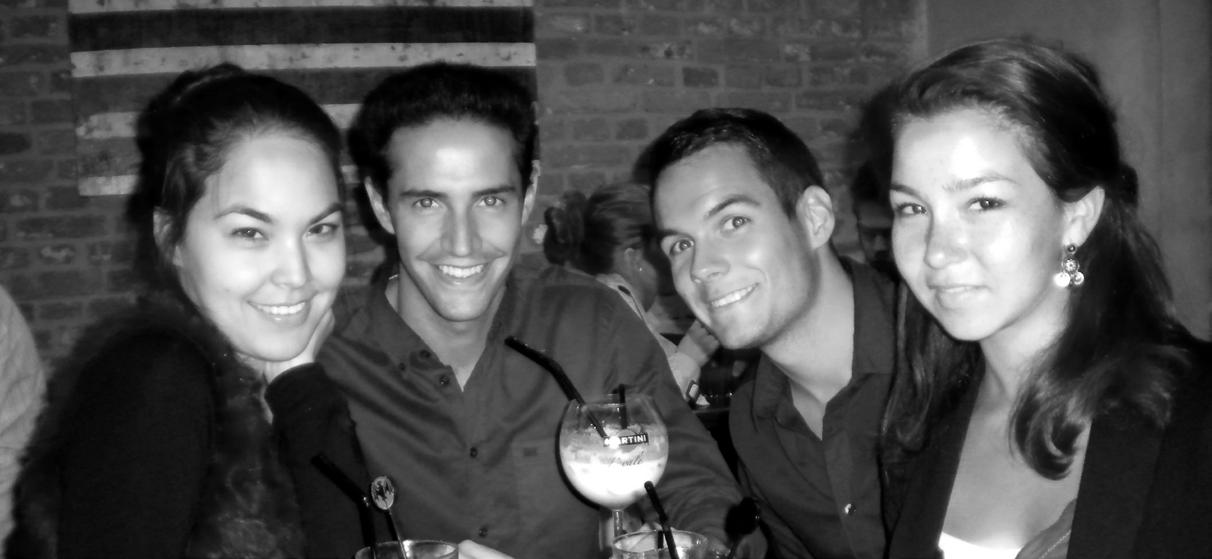
A little postcard to home, which is not that far, but life on exchange is always worlds away regardless. Having just returned from a run around the beautiful, autumn coloured Citadel on a surprisingly sunny day (it’s the North after all), I’m enjoying the morning of my extended weekend with Le Monde and a croissant – a ritual to reinforce my stay in France.
As we have been reassured by the International Officer M. Guillaume at first instant here, there is little need to seriously worry or stress about academics at the prestigious institute Sciences Po and plenty of time to enjoy l’Auberge Erasmus. Trips take us, ‘les internationaux’, to Dunkerque, Brussels, Paris or even Granada, or just to one of our apartments for an International Dinner or Celebrate Election Night.
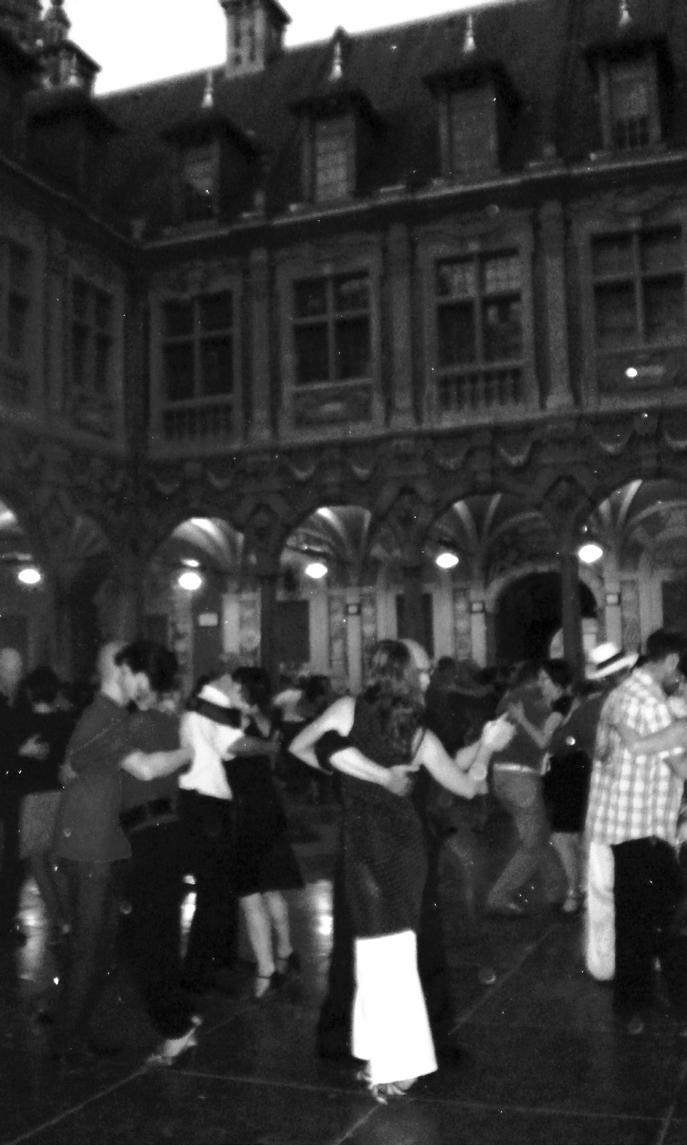
While we decided to major in cooking, culture and language, with a minor in French administration and bureaucracy, I do bike to Sciences Po for very interesting lectures on Aristotles’ man, the woman and the ox, the Eurocrisis or state-building in the Caucasus. Even more happily so I take


the books from the library to Notting Hill, a coffeebar where the barista salutes my American friend Jennifer and me, asks ‘comme l’habitude’ and informs after the latest news. Indulging the caramel lattes and muffins, neither French nor Belgian but rather Starbucks style, we discuss our political systems, as faithful political science students, and then turn to universal students’ concerns.
So even on days that the rain continues to pour down, the cobble stones and French drivers are a serious danger to my life, and several French institutions demand even more documents signed sealed and delivered, I smile, put on a hat and go out to stroll in the streets that feature an eclectic form of architecture in their old beautiful buildings. When one gets to live bits and pieces of Midnight in Paris by finding a 1912 edition of Rousseau’s Selected Essays or Les Lettres Persanes in an ancient book market, or by stumbling upon an open dance tango night in the magnificent atrium that used to be the Vieille Bourse, there is only the UCSA bar and the campus living rooms to miss every now and then. See you there in January, dear UC friends!
Bisous de Lille, Fleur
Fleur Verbiest Home university: University College Utrecht
Host university: Sciences Po, Lille, France
Marion Becmont and Annie Schultz
Home university: Sciences Po, Lille, France

Host university: University College Utrecht
Utrecht, 8/11/2012
Only when we arrived in the Netherlands, we realized that non-French people believe that all Frenchies smoke and try to prove that they are better than the rest of the world.
At first, we were shocked by this dreadful image: us, judging other people’s way of living? Come on! We are college students, open-mindedness defines our very selves.
But, still, why on EARTH would Dutch people have a break in the middle of a movie in the cinema to buy peanuts that are three times more expensive than those at Albert Heijn? Why would you have dinner so early that you go to sleep with an empty stomach? Why only sell giant-sized bikes on which you have to pedal backwards if you want to slow down, while the rest of Europe has adopted the regular bicycle breaks?
Nevertheless, we must admit that for most of our time here, “la vie est belle”. The wonderful thing here is that everyone is able to show you the way in English, even an 80-year-old “oma”, which is something really impressive to a French person. Never go on holiday to France without your Van Dale dictionary! Also, us being real French people who
take the car to do grocery shopping, we have to humbly bow our heads for the Dutch mothers’ cycling proficiency: how do they manage to bring five children to school at the same time, on only one bike?
When it comes to the bubble we entered, we were surprised in a very positive way. The most impressive thing for us is the diversity and quality of the arts, which provides campus with amazing shows and events. The Open Mic and Improv Night were amazing in the way students interact with each other and offer us an entire evening of relaxing and laughing. Another special thing here is the international atmosphere we live in. You easily forget in which country you are, sharing ideas and experiences with people from all over the world thanks to a common language: how many opportunities like that do you get in life?
Marion Becmont & Annie Schultz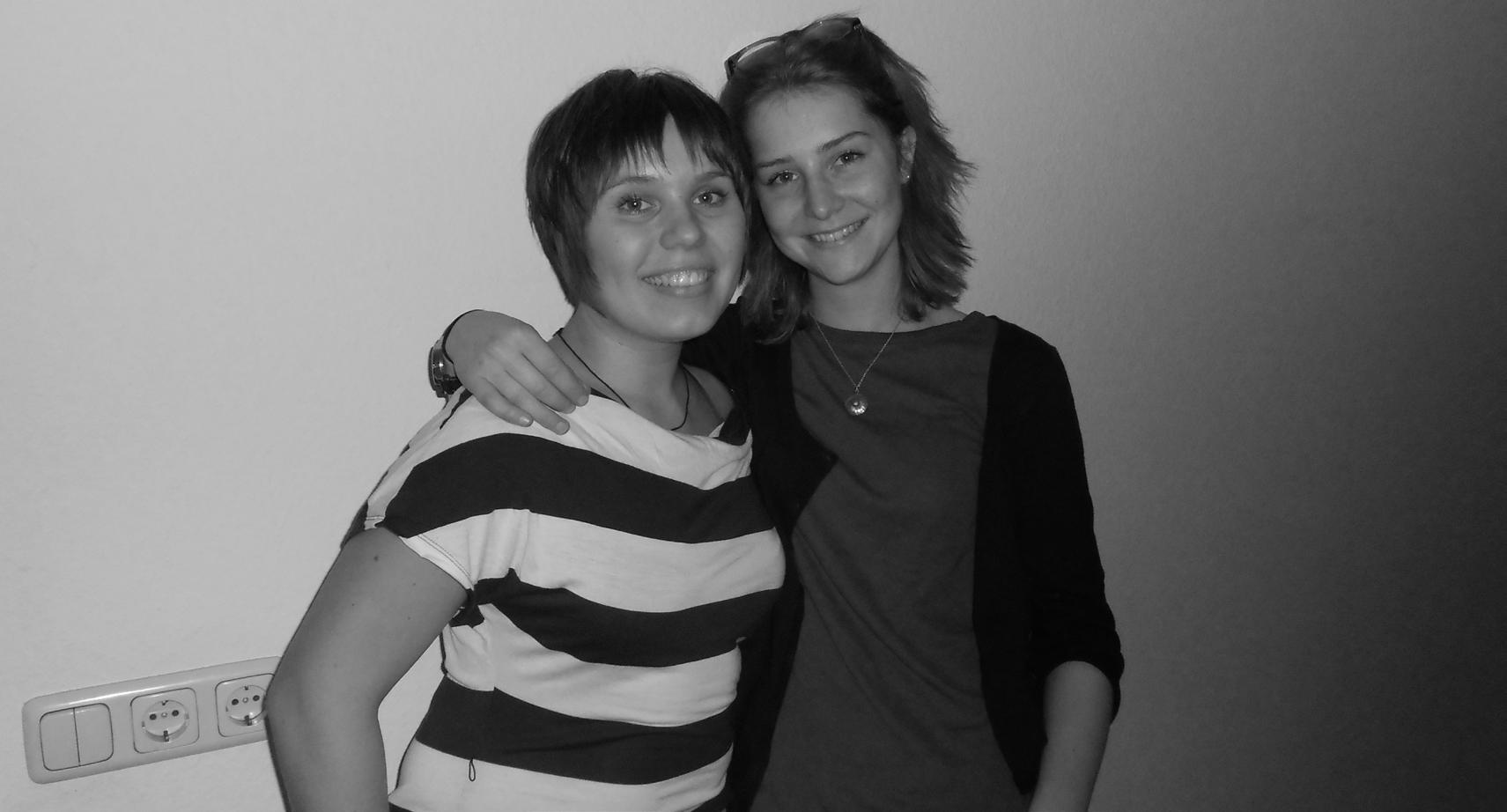
The BarCo Board refused to implement this decision. “We decided this because the Policy Manual gives us managerial power over the bar. We’re not denying the UCSA Board anything, but using the power we have been given,” Inventory Manager Jasmine Reggiani says.
So what are their arguments? “There should be a difference in discounts for the BarCo and the UCSA Boards because the UCSA Board already gets other benefits, for example the networking opportunities,” BarCo Chair Willem Mouton says. He also mentions the course load reduction, government subsidies, and the seventh semester. “We find these benefits to be completely justified, but question the addition of yet another,” Secretary Marie Gillesen says. “The tab is our only benefit and it is insulting that they want the same.”
According to her, the extent of discount should be related to what a member does directly for the bar. “Since we do the most, we should have the largest discount.” In line with this, BarCo Treasurer Steven Minke says that
Full Discount: all products sold as close as possible to buying price without the bar making a loss
Partial Discount: full discounts on all products excluding hard liquor, e.g. shots
Semi-partial-quasi Discount: same as partial discount, but shots priced between buying and normal price
full discounts for the UCSA Board have no added value for the Association, whereas discounts for the BarCo Board do, as this encourages them to dedicate more time to the bar. “It
plied with.
But both boards realized that to preserve their relationship, a compromise was necessary. Several options were on the table, in-
Art. 3.1: The Association’s objectives shall be to represent the interests of all its members […].
Art. 15.2: Although committees enjoy discretion concerning their actions and activities, the UCSA Board retains overall responsibility and thus the final say in any matter relating to the functioning of a committee.
is a big issue, because in a very indirect sense, it affects the money of the members,” as the bar makes fewer profits when more people are allowed to drink at buying price. “It would only add to their personal benefits, which, from our point of view, is an abuse of power,” Mouton says.
BarCo Board mentioned another issue: discounts are the only compensation they receive for the twenty hours a week each board member spends on ensuring that the bar runs smoothly. According to Independent Body member Omri Preiss this cannot be used as an official argument, as that would be in conflict with the Policy Manual, Art. 26.3.
With BarCo Board’s refusal, the problem became a matter of implementing UCSA Board decisions, as based on the Statutes Art. 15.2 the UCSA Board has a final say in committee matters. They used this right: BarCo was given a deadline to implement the discount before midterm break, which they com-
cluding full discounts for BarCo Board members and semi-partial-quasi discounts for the UCSA Board, or putting the matter before the members at a GA. The latter was chosen as both considered it best for the Association to find a final solution and formalize it in the Policy Manual, especially since this has been a source of friction in previous years, too.
So now it’s done, and hopefully, everyone is happy. But this depends entirely on what ex-
actly we were asked to vote on at the GA: The existence of discount tabs in general? Whether there should be different degrees of discount and who is entitled to them? If you believe that the formulation of these questions prevented the problem from being solved in a way most beneficial to the members, you can, according to Preiss, suggest agenda points and votes once the preliminary agenda for the next GA is sent out, or you can get ten percent of your fellow members – about 75 people – to sign a petition to bring the vote to the GA.
Embracing democracy and all that.
Art. 26.2: The Bar Committee manages the UCSA College Bar and therefore carries managerial responsibility over the UCSA College Bar including, but not limited to, its finances, mainstocks, security, and s cheduling, yet excluding limitations mentioned under article 26.8.
Art. 26.3: All work done for the UCSA College Bar is done on a voluntary basis.
Art. 27.2: The Bar Committee Treasurer or other members of the Bar Committee board may be given specific power of attorney […] for the signing of tab or small sale contracts, at the discretion of the UCSA Board.
How objective is grading at UCU considering it is not done anonymously?
Klementina RistovskaProfessors I interviewed agree that within the current system bias probably exists. Yet, opinions on whether this is a problem that requires measures are radically divided. “There might be an issue with anonymity but I think, in comparison, it is relatively minor,” says Teaching Fellow and Professor Guus de Krom. He believes that there isn’t any formal, solid reasoning behind the current practice. “It is one of those things that we do simply because that’s how we do it,” de Krom says.
Every professor has their own approach on whether and how to ensure anonymous grading. Methods range from no action at all to strict anonymity rules, as with Professor Rosemary Orr who even instructs her students that “any form of self-reference in the exam will earn them an F”.
“It is not fair to anybody if my personal prejudice influences grading,” Orr says. In her classes, she has developed a system using randomly generated numbers for identifying exams. She cannot know who received what grade before she distributes them back in class.
Professor Orr mentions an eye-opening past experience. In her linguistics course, Orr had a student whom she personally knew very well: the student was looking after her children and did a research project with her. The same student got an A+ in the class for an outstanding paper. “The girl would have never gotten her A+ if I had known her identity when grading, because I would think I’m being influenced by knowing her personally,” Orr said.
When grading is not anonymous, familiarity with the student’s ability and previous per-
formance influences grading even if unconsciously. Orr finds this unacceptable.
On the other hand, Psychology Professor Christel Lutz currently grades exams blindly, but opposes mandatory blind grading because of class-specific cases. In her 300 level psychology course, she admitted students who had not taken the prerequisite psychology courses, but had neuroscience experience. “It matters where the student comes from – what their learning progress is”.
“If there is any bias, it is positive rather than negative,” says Director of Education, Fried Keesen. From a science professor’s standpoint, Keesen says that a teacher is always hoping to see good results by students. If a written work feels disappointing at first and he had a better impression of the student previously, he rereads it before grading.
The issue here is fairness: professors know some students better than others. Are some students at a comparative disadvantage in relation to the benefits their more vocal colleagues earn because the teacher knows them already?
Lutz brings psychology research insights into the debate. “Negative biases exist in very specific environments. When there are groups about which stereotypes of their academic performance exist, plus there is not much knowledge of the individual student.” An extensively studied case is the one of black students in the USA and negative stereotypes about their academic capabilities. This explains the obsession with anonymity at large US universities. “These criteria might not apply much for the UCU environment”.
“Be careful what you wish,” says Philosophy Professor Floris van der Burg. “I am ninety five percent sure that the bias is in students’ favor. Grades on average will go down if there was complete blind grading,” van der Burg says. From across the room, Professor Orr agrees with this. Regardless, she still strongly favors anonymity.
Orr seems lonely in her advocacy for blind grading, as many others oppose the implementation of a unified, university-wide policy on this.
“Anonymous grading goes against the philosophy of what we’re doing – maintaining a very close student-teacher relationship,” Lutz says. Similarly, Keesen thinks “it is fostering a culture of distrust” to have such bureaucratic measures. “If the cure is worse than the problem then it would be wrong to implement the policy,” he says.
ments in assessment that would help against bias, but in the end it always boils down to: more work needs to be done for the same amount of money,” de Krom says. There is always the cost-benefit trade off to consider before implementing a policy.
“Anonymity givesyou objectivity partially, but it doesn’t give objectivity per se,” Lutz says. She stresses that other grading aspects are more important, such as transparency and clearly communicated grading criteria. De Krom emphasizes the importance of feedback. “Feedback is vital for the learning process and it also makes grading more transparent,” he says.
To pass a policy on this, first the Exam Board would need to decide that there is a necessity. Then, according to de Krom, they would probably ask the Director of Education to formulate policy proposals on which again the EB will decide.
Be
“At this college there is a culture of having faith in the professional integrity of the professors. Rather than implementing top-down measures to make sure that [professors] do what they’re supposed to, there is a tendency to have confidence in them,” de Krom says. “But this is not a reason not to take measures if it’s needed.”
As with every issue, practical constraints abound. “It is not difficult to think of improve-
“If students feel there is a problem, then this needs to be investigated and solved. In this case they should come to ASC and we will discuss it and look at the issue,” Student Assessor Rens Bakker says on the issue of anonymity.
After all, the whole objective and fair grading thing can be re-considered. “Perhaps grading should be somewhat subjective” second year Veerle Oosterban says. “We shouldn’t be graded perfectly objectively when what we are doing here is supposed to prepare us for the real world where everything is subjective.”
it would only add to their personal benefits, which... is an abuse of power
careful what you wish
There are many wonderful books in my unit’s bookcase. They are books I’ve carefully selected, based on a friend’s advice, or bought after I was enthused by the back flap. There are also books that I received and thought were worth the read. Like all cheap IKEA bookcases provided by the landlord, mine doesn’t have any doors, so the covers of the books are exposed for every passerby to see. And that can be dangerous: books are among the most important things to define who a person is.
In this respect, I have a lot to hide. Under a mountain of junk in my closet I have a cardboard box. It contains books dating from my “ECI period”, some of which are still sealed in plastic. The ECI is a so-called book-club that employs poor students looking for some easy cash. They stand on the street selling random passers-by a membership, or rather a contract forcing you to buy a certain amount of books each quarter of the year.
I was naïvely intrigued by one of those students’ sales pitches: “Do you read books?” Yes. “Do you spend over 30 euros per quarter on books?” Yes. “Would you like to order the same books for less money?” Yes. “I have a great offer for you!” Scribble scribble. Unfortunately, I repeatedly forgot to state which books I wanted for that quarter, and therefore the ECI randomly selected books for me every three months. The ECI calls this their ‘quarter selection’. Read: Highly uninteresting prose about the most nonsensical themes imaginable. It was a true waste of money. The only book of any value was one by Heleen van Royen, which now serves as a stable stand for my television.
I am complaining to you about this difficult experience because I want to compare it to a similar scenario, as the vast majority of us are citizens of the European Union. Our governments select a number of conventions and pieces of legislation every couple of years and merge them into a treaty. In 2005, this led to the European Constitution, a 359-page book with thousands of legal articles that cannot simply be summed up on a back flap. Small wonder France and the Netherlands rejected this constitution immediately.
Now we are facing the euro crisis. Despite no one really knowing how to solve it, as I told you in the last issue, all Brussels’ bureaucrats agree on one thing: If we really want to unify Europe, as a first step, we need another one of those huge legislation compilations. Now, if people like me use the aforementioned books as worthless Sinterklaas presents, how many of us are really going to be interested in reading, and trying to understand, a treaty like that? And unlike the ECI books, once such a treaty is adopted, we will have to live with it. In fact, many of us are unaware that such a treaty will likely determine much of the rest of our lives.
Carlos Granados Martínez
Obama won. Good thing. What to do after the proud-tobe-an-American fever ends (especially among non-American students)? Now that we have settled our doubts about the future, we might as well find something else to concern ourselves with (don’t you just love first-world problems). One of the big things to consider is how will China react to the result of the American election. Time is passing and a switch of superpowers seems inevitable- but whether it will be on friendly terms or Pandemonium we still don’t know.
Questioning whether ‘the Sleeping Dragon’ will awake full-bellied or hungry is irrelevant. (We’re past that point guys and, besides, addressing such a question only thrusts China into the spotlight and makes the whole thing a big issue). The to-be president Xi Jinping has already pointed out how he is after a new type of relationship between the main superpowers in the 21st century.
But rest assured, his relationship status with the US on Facebook is not likely to change to ‘it’s complicated’, mainly because there is no Facebook in China.
From an international perspective, the core of the above assertion by Jinping is nothing more than trying to make the shift in the balance of powers as peaceful as possible. If China shares increasingly more power with the US, the stepping up to the podium will be smoother than if all of a sudden ambassadors’ reports show that the country has suddenly reached the ‘U Can’t Touch this’ point.
The Problem here is that Mr. Xi Jinping seems to be forgetting about the group vs. individual notion that Asian countries are known for. His claim doesn’t take into consideration Obama’s plans in Asia, but then again, what is diplomacy more than telling somebody to screw himself and making them feel good about it? The incumbent president announced how US troops were to return to Asia as part of his ‘pivot’ policy. But how
different is it from a containment policy in the eyes of the Politburo?
What might seem as little more than a lost-in-translation argument could easily escalate into something ugly. Plus, let’s not forget about Japan and China! (Ever heard about ‘the tyranny of choice’?). Both countries share traditional military ties with the US and strong economic relationships with the Asian giant. This means that picking to side with one or the other could easily translate as moving into blocks (not good). Food for thought.
At this campus, students are dependent and learn no life skills. It starts with our rooms being served to us on a silver platter - no weeding out of gross places or dodgy areas, no being rejected from shared flats, and never having to worry about maybe, possibly, ending up homeless.
Then the rooms themselves, which are absolutely ginormous by student standards: ever given a thought about furniture, heating, or water bills? Probably not - all is being taken care of with one big check at the beginning of the year.
Sure, we’re supposed to keep the units clean -but take a random sample and you’ll see how well that works out. Something broke? Oh, just email the landlord or Maarten Diederix, and open the door for them. You’ll never have to change a light bulb or learn valuable skills like unclogging toilets. And food. The platters in DH are not quite silver, even though, considering the prices, it feels like some of them should be. The good news: you never have to fight over hotplates or set foot in a supermarket. Just live your lazy life and tell yourself that you’re focusing on academics – which may be tough here, but we still get a lot of help. Tutors are basically academic babysitters; at other universities, students are expected to register for classes themselves. How could we possibly learn how to live independently here? We’ll be in for a shock once we enter the real world and knowing how to write a kick-ass thesis will be of no help whatsoever.
We keep hearing it over and over: we are a bunch of spoiled little brats, whose biggest problem in life is a five-minute wait in Dining Hall. But how exactly is learning to run a household at this age essential? Is being a student really about spending countless hours on doing groceries, quarreling with your landlord over rent, or mixing 20 detergents in your sink?

By eliminating these ‘practical’ worries of life, UCU has successfully turned us into the superhumans that our society needs. Juggling ten committee meetings in one day, producing high-quality academic material at the speed of light, organizing time-consuming events in the blink of an eye and budgeting with ease... Few off-campus people have acquired this wide a range of valuable skills, regardless if they happen to know more about cooking.
In the end, isn’t this our most formative age? Sooner or later we will have to face the harsh adult life. But right now we are better off analyzing postmodern literature and arguing about 21st century human rights.
True independence lies in the mindset. Ultimately, in the end we do live on our own: we still have to manage our time, look after ourselves and, dare I say it, make decisions. Many of us don’t see their family for months and can’t call Mommy when faced with an impossible task. It is safe to say that UCU gives us the best balance: being on our own, but with the freedom to be an engaged student. And whenever people question our independence, we can always remind them that we do our own laundry.
UCU students will never become independent at ‘Hotel UCU’ PROMama’s

“Now, it may sound as though I’m about to preach atheism, and I want to reassure you that that’s not what I’m going to do… No, instead, what I want to urge upon you is militant atheism.”
Richard Dawkins pronounces these words with a conviction worthy of a self-proclaimed prophet – much to its irony. In his talk “Militant Atheism,” he breaks the taboo of speaking ill of religion, bluntly calling for an attack against religion as a whole. Too reckless, perhaps? Well, considering the fact that he’s an Oxford professor and that I’m supposed to endorse this fiery talk, let’s just say he’s dangerously audacious.
So are science and religion really as irreconcilable as Dawkins suggests? Watch Sam Harris’ talk “Science can answer moral questions” and you will encounter the more radical neo-atheistic view: religion is not only ruinous; it’s stupid. Answering questions of good and evil through science may feel absurd and counter-intuitive. But before you dismiss this as atheistic gibberish, hear Harris out: “Values can be reduced to facts.” How so?
While Dawkins and Harris are the more extreme proponents of entirely abandoning religion, Michael Shermer digs further into the foundation of mankind’s belief system. He postulates that humans are naturally inclined to overlook facts and establish non-existent evidence for myths and superstitions.
Shermer sheds light on the more interesting question of why people believe what they believe. Two of his talks, “Why people believe weird things” and “The pattern behind selfdeception,” deal with urban legends and far-fetched religious “miracle” stories. Did you ever see the face of Jesus amongst the looming clouds? Now, get yourself examined here. For free.
These are fervent scientists (and atheists) denouncing religion as a work of fiction, or at least as a system that contradicts reason. For an amusing comparison, also check out what the twenty-first century’s best self-help author has to say about atheism. Alain de Botton looks at which aspects of religion should be adopted by atheism. His “Atheism 2.0.” can incorporate elements such as human need for connection, ritual, and transcendence, while promulgating its God-free position.
To make sure that you’re not misled, understand that TED is simply the platform for discussion. The talks suggested this month may seem slightly biased (oh, what an understatement) towards science cohorts, but there will be just as many rooting for religion to compensate in the next issue. So be patient, give each talk some thought, and follow up on what the pious have to say. The battle continues!
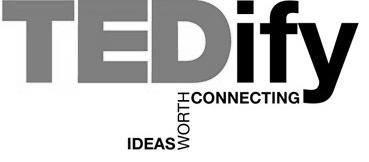
Talks:
Richard Dawkins “Militant Atheism” (2002)
Sam Harris “Science can answer moral questions” (2010)
Michael Shermer “Why people believe weird things” (2006)
Michael Shermer “The pattern behind self-deception” (2010)
Alain de Botton “Atheism 2.0” (2011)
Dan Dannett “Responding to Rick Warren” (2006)
Julia Sweeney “Letting go of God” (2006)
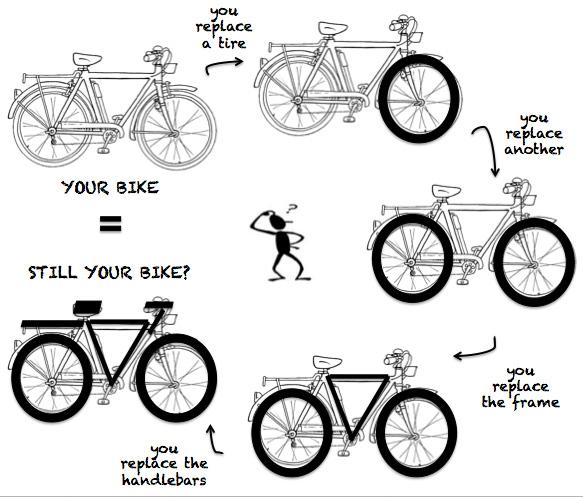 Elena Butti
Elena Butti
Bikes, too, get sick of the Dutch weather sometimes. It starts with a flat tire, which you can easily replace. Soon after, the second tire follows. Then it’s the breaks, the handlebars, the frame… bit by bit, as the months pass by, every single piece of your bike falls apart and is substituted. Is it then still your dear old bike, or is it a brand new one?
Of course it’s still your old bike, you might say. You’ve just gradually replaced the broken parts, but the bike is still the same. Undoubtedly, your bike doesn’t change if you just replace one tire. And two replaced tires do not seem to make a difference either. But how about two tires and the handlebars? Well, the frame is still from the original bike. Is it then the frame that makes your bike really your bike? This sounds unconvincing, since if you took the frame of your bike by itself, you wouldn’t call it your bike (but just your bike frame). So what is it that makes your bike really your bike? And does your bike still remain your bike, if you have eventually replaced all its pieces?
The picture gets even more complicated if we imagine that BicyCo, for some obscure reason, collects all the broken pieces of your bike and reassembles them in a bike which is…whose bike? In some sense, this second bike made up of all the broken and fixed pieces of your bike is more “your bike” than the one made up of replacement pieces.
But you still call the latter “my bike”, since there wasn’t a precise moment in which you changed it – rather, you just substituted parts of it as they
broke down. Which of the two is the original bike? The one you use, made up entirely of replacement pieces, or BicyCo’s one, made up entirely of the original pieces? And which one is “your bike”? Are they both yours, or is none of them really?
The bike paradox is just the modern Dutchified version of a philosophical issue that has been debated since the times of pre-Socratic Greek philosophers: the Ship of Theseus. The Greeks replaced planks instead of tires, but the key concept was the same and stands at the core of the notion of identity. What is it that really makes a thing what it is?
The problem doesn’t stop at bikes or ships. What if you needed to have your leg transplanted? You would still be you, even with a new leg, no doubt about that. You would have changed just one part of your body. But what about your brain? Is it also just one part? Assume for a moment it was possible to transplant your brain, with all your memories, thoughts, emotions and personality into your philosophy teacher’s body, and vice versa. Is it you having a new body, or your teacher having a new brain? Who is you, and who is the teacher? Or have you both disappeared? This might be relevant in order to find out who of the two should teach the next class on philosophy of mind: your brain in your teacher’s body or your teacher’s brain in your body?
If you manage to answer this question, you might as well teach the class yourself – whoever you think “yourself” is.
The phrase “too many” is often used negatively. Complaints of having too many meetings or too many assignments or too many exams are seldom accompanied by a smile. But with up to 25% of young people owning a blog, what about too many blogs?
We live in a time when everyone is connected. The Internet has become a stage and more and more people want to take the microphone. Simply telling Facebook what’s on your mind is no longer enough, people want an audience that stretches beyond their personal network. This is where blogging comes in. From a daily diary to a personal catwalk, a blog is a blank canvas, which can be transformed just as the owner pleases.
Mass production is almost always shunned in favour of exclusivity - people seldom do things to be one of many. The blogging world is no exception. Bloggers want their blog to be unique enough to attract an audience; the very essence of sharing your thoughts is for them to be heard and appreciated.
You can compare the experience to shopping. Although you love those skinny jeans in H&M, you know that when you wear them to class on Monday it is likely that someone else will too. So instead you go to a vintage shop in search of something more unique. Similar to H&M, blogging is very accessible; anyone can cre-
ate one. So if you are thinking of creating one, or if you already have one, you want to try and make it a vintage shop rather than an H&M – you want it stand out.
But as with most things, this is easier said than done. The internet’s a big old place, and working out how to get that unsuspecting browser to read about your homemade chocolate chip cookie recipe over the millions of others available is no easy task. As a blogger, you are competing with literally millions of other bloggers for those coveted Regular Readers.
We asked UCU student Oliver Muenter, blogger at http://www.wanderlust-and-such. blogspot.nl/ and UCU contributer for http:// www.collegefashionista.co.uk/, for some key tips:
1) Photo Quality
No matter what website you’re posting for, having photos that are clear and professional looking is essential. The better your photos look, the better your blog will look. It sounds simple, but this is often overlooked. Focus on taking photos in good lighting – dawn or dusk are always good times.
2) Organization
Having a clean and easy-to-access format for your blog is always important. People tend to pass over blogs that are too cluttered or too bare. Make sure your font and photos
This time we asked fellow students to tell us 1) the one item in their closet they can’t live without and 2) where they bought the outfit worn in the photo.
coordinate and are clear and easy to find within the blog.
3) Blog Networking
Personally, I think this is the most important part of successful blogging. Always link your blog and blog posts to other social media outlets: Twitter, Tumblr, Facebook, Pinterest. Be sure to read other blogs consistently and comment accordingly. Develop relationships with other bloggers through common interests; I’ve met some of my greatest friends through blogging.
4) Personality
Simply put, you can’t try to make your blog look exactly like someone else’s and be successful. Put your personality into your posts and make it all your own. Individuality is what people respond the most to. Style is important, of course, but humour and wit go a long way in terms of attracting readers.
5) Consistency
This is kind of obvious, but it’s harder to keep up with a blog than you may think. Posting regularly – whether it be every day or once a week – is important to maintaining consistent readers. Consistency with posts is also key. Variety makes things interesting, but you’ll confuse readers if you post something completely different each time. Focus on a couple key blog themes and go from there.
If fashion were a country, online blogging would be its president. A sort of virtual catwalk, blogs provide a perfect forum for fashionistas to showcase themselves to the world. Here at UCstyle, we have compiled some of our favorites for you to check out, and perhaps get inspired by.
1. http://lookbook.nu/
A classic - whether seeking inspiration from another fashion lover or wishing to share your new purchase with the world, lookbook is your blog.
2. http://www.thebudgetfashionista.com/
As suggested by its title, this blog is all about being fashionable on a budget, thus perfect for a student! With categories such as DIY and Eco Fashion, the versality of this site makes it worth a browse!
3. http://www.style.com/
Keep up with the latest fashion news, from fashion week to celebrity trends, this site is the first stop for all those in the know.
4. http://www.fashiontoast.com/
Rumi Neely, a blogger-turned-model captures her daily unique outfits and her inspirations, showing the fashionista how it’s done.
5. http://www.thesartorialist.com
Often coined THE original street style blog, the sartorialist is a fantastic collection of spontaneous photos of people from around the world. With features such as “If you’re thinking about... (Denim on Denim/Bandanas etc)” the blog makes for a perfect outfit inspirer.
1. The one item I can’t live without would be my blue adidas sports jacket with white stars on it. I think it’s super funky.
2. The high heeled boots are from Fred De La Bretoniere, bought in Utrecht. The Leathery-like pants I got from River Island in Amsterdam. Last year I participated in the EWG Swapshop where I found this black jacket. Lastly, the T-shirt with Kate Moss is from Review. I bought it in Latvia, in Peek&Cloppenburg just because I thought that it was stylish because it has Kate Moss on it and Kate is always stylish.

1. I can actually live without any of my clothes... don’t have a favourite piece or something like that.
2. I actually just bought this sweater when visiting my sister in London this weekend. She sort of forced me into buying it, butnow I am actually quite pleased with it since it is extremely warm, comfortable and it doesn’t tickle! Shoes are from Filling Pieces, a new brand by a young Amsterdam designer, that I happen to know. Thing I like the most about them is that he used the coat of Amsterdam in the design. The rest of what I wear is just bought randomly.
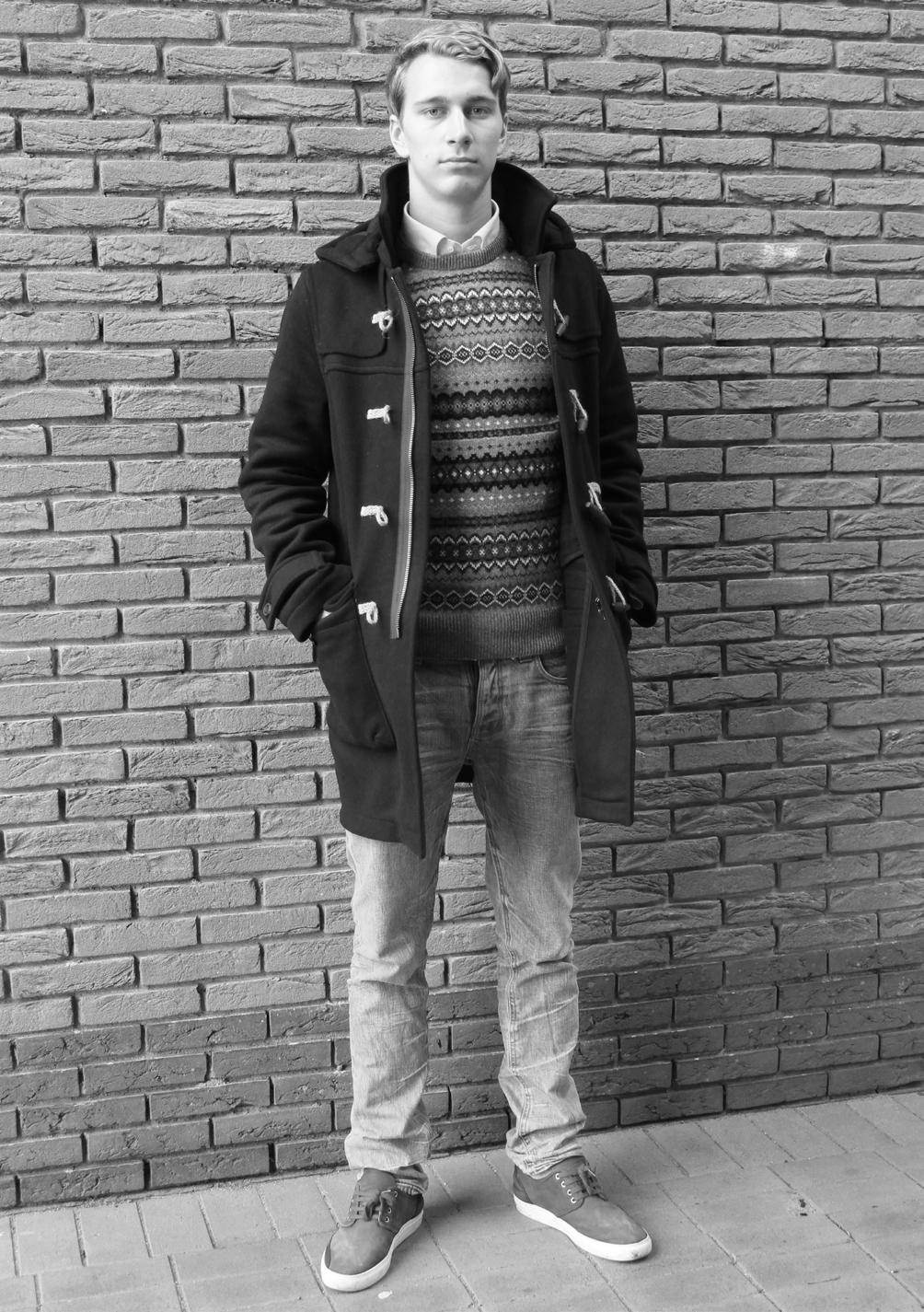
Do you feel as if this page hasn’t quite satisfied your thirst for style? Would you like to see more streetstyle photos of your fashionable campus friends? Do you want to read more fascinating features about the fashion world? Do you need outfit inspiration for your next hot-date? Do you need more distraction and procrastination material?
Good news! UCstyle is launching its very own blog, which will feature more streetstyle shots, special features, beauty tips and tutorials, product reviews, city spotlights and information about future workshops and special events (think swap shops and mini-makeovers).
Visit https://ucstyle.jux.com/ now!
targets, kill them and dispose of the body. Part of the contract is to kill any target without hesitation and failure to do so is punished with death. When looper Joe (JGL) realizes that his target is his 30-year-older self, he hesitates and Old Joe (Willis) escapes. The mob sends its henchman after the two, while Young Joe tries to capture Old Joe himself to fix his mistake.
characters is authentic. Who doesn’t feel like punching one’s past self in the face for being an idiot every now and then? The superb performance of supporting actors such as Jeff Daniels, Emily Blunt, and Paul Dano adds to the experience.
Looper is the upcoming sci-fi thriller starring Joseph Gordon-Levitt (Inception) and Bruce Willis (you know who).

In the future, time-travel is invented and immediately prohibited. Only the mob uses it to send its victims back in time, to the year 2044. Assassins – the eponymous loopers – await the
You might think that Looper shamelessly steals from other time-travel flicks. But the movie does a fantastic job at creating its own believable dystopian future. Social decay, technologies and other novelties are only subtly hinted at. Inevitable plot holes or paradoxes are nullified by the characters’ refusal to explain or think about it too much. For instance, when Willis’ Joe is confronted by JGL’s Joe about the implications of timetravel, Willis bumps his fist on the table and shouts: “It doesn’t matter!” What’s more, the story repeatedly shifts its pace and themes, which is a surprising and pleasant substitute for plot twists.
The dynamic between old Willis and young JGL made me chuckle more than once and the difficult relationship of their
Also, I was happy to see that there was no overuse of CGI –a common defect of contemporary sci-fi movies. The makeup artists of this film did an incredibly job at making GordonLevitt look like a younger Willis. In fact, it works so well that I was sometimes distracted by how much JGL’s appearance was changed.
There is so much more I want to talk about, such as the splendid dialogue, the amazing child actor, or the specifics of time-travel in this film. But I think it suffices to say that, despite the tough competition in 2012, Looper is one of the best action films of the year.
Looper will be released in the Netherlands on 29th November, 2012.
In this section, Boomerang writers will present you their favourite non-mainstream TV shows, and convince you of the necessity to watch them. We start out with Once Upon A Time.
Go back to your childhood for a second. Imagine when you would play pretend, and you were a heroic knight or explorer of lost worlds; when monsters bowed to your might and magic literally lay in the palm of your hand. These were the times when everything was possible. Haven’t we all dreamt once or twice of all that being true, no matter what our parents and teachers said? Magic existed - we just didn’t know how to use it.
What if magic was real, but we just didn’t remember that it was? This is the premise of Once Upon A Time. Storybrooke seems as boring as any other small town, but unlike most other small towns, this one has been cursed by Snow White’s evil
stepmother, Regina. All inhabitants of Storybrooke are characters from fairy tales, but the curse has made them forget their true identity. Now, they are forced to live the same bland lives as we do ever since we grew up, in a world without magic. Clearly, this curse must be broken.
This is where Emma Swan comes in. As a metropolitan woman, she lacks entirely the dreamy ideology we associate with our Disney heroines. Life never granted her a fairy godmother, and she has learnt to get by without one. It is up to Henry – the son she gave up for adoption years ago – to convince the rest of the town, and Emma in particular, that the curse is real. That Snow White and Prince Charming, Rumpelstiltskin and Belle, Granny and Red (Riding Hood), and count-
less others are all there, slumbering in the depths of everyone’s memory.
Once Upon A Time makes for perfect distraction during those dark, gloomy days ahead of us. This is the show to watch when cuddled up in a blanket, hot cocoa in hand. It weaves an intricate pattern of relationships between well-known characters, creating original story lines and adding depth to the stories we already know. This show is a must-watch for anyone who ever enjoyed Beauty and the Beast or Peter Pan, and who wants to relive that feeling we all once had: the hope for the seven dwarves to march by, or for the letter bearing Dumbledore’s signature to finally arrive.
Recipe by Wall 29
Too lazy to get out of bed during the weekend, running low on cash yet desperately craving something good to eat? Behold the answer to all your problems: A delicious, simple and above all, cheap frittata. This recipe consists of ingredients that you can easily get in supermarkets or steal from your unit mates; whipped up in 15 minutes and devoured in even less.

Ingredients
• Olive oil
• 1 whole scallion (use only the white portion)
• 7 white button mushrooms, diced
• 1 whole tomato, diced
• 2 eggs
• One small potato, boiled and sliced
• Parmesan cheese to taste (grated)
• Salt and pepper to taste
Directions
• In a pan, begin by adding olive oil and cooking the potatoes
• Once half cooked, add the diced mushrooms, scallions and diced tomatoes
(leave to simmer for 2-3 minutes)
• In a separate bowl, lightly beat 2 eggs
• Pour beaten eggs into pan and take care to gradually mold the mixture into a circular shape
• Add grated parmesan cheese, salt and pepper to taste
• Once the eggs are fully cooked, remove delicately from pan
Let your imagination run wild and add as many components as you like. Served piping hot and accompanied with tea/coffee/ juice, this meal will surely be a great start to your day.
We’re always striving to find new and exciting topics for the Colosseum – we consider it a personal challenge to talk about different art forms and pick the oddest, most exciting movies, books, etc. for reviews. Thus I was trying to find a nice, postmodern exhibition of sorts to write about – the kind of art that I find aesthetically very displeasing but intellectually very satisfactory. No luck. But then, this morning, it being a Saturday, I insisted on reading one of my favourite online comics ‘Saturday Morning Breakfast Cereal’ (in true form, while eating cereal) rather early in the morning.
I realized that webcomics are perhaps one of the most exciting and insightful representations of postmodern art nowadays. Seeing how to me they are more aesthetically pleasing than the average work of art in the Centre Pompidou in Paris, I have much more contact with them and can competently - from the perspective of a procrastinator that spends precious time looking at ‘PhD Comics’ and lamenting the fate of those students that can’t meet deadlines all the while I’m supposed to meet mine - give assessments.
Webcomics blur the boundaries between reality and fiction in a manner that presents outrageous situations as normalized within our everyday language and normal situations as outrageous expressions of our deepest and guilti-
est desires. Webcomics are postmodern in that they express the essence of relativity. They make up relative realities that either have a coherent narrative which does not claim to encompass the wide truth of the human race or they employ generalizations that in some metaphysical level make fun of generalizations.
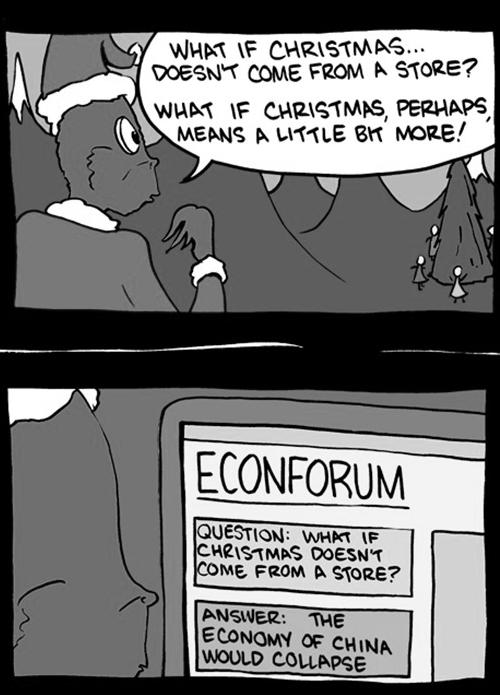
Webcomics can be outright silly, sexual, brutal, sexist, racist and a myriad of other politically correct and incorrect expressions, sometimes to touch upon precisely that kind of silliness that requires us to behave in certain ways. Now, I’m incredibly uncomfortable with the explicit sexism and racism of many webcomics and I will probably continue to be so, but I can by all means appreciate an approach which advocates laughter and comicality as means to address deeply ingrained social issues.
The opportunity to ignore requirements for coherent narratives, a requirement that is very present for printed comics, allows webcomics to engage in a form of cultural criticism that might have even been intended as a peripheral result of another point in need of addressing. A webcomic writer can afford to make a one-off remark about every kind of silliness without having to engage in a defense on his topic or approach of choice. Hence, his work can have a very powerful impact on how we perceive social issues as it is, so to say, uncensored. Stay tuned for a more detailed exploration in the next issue!
In the end, it was Evelyn who succumbed first. I guess because she was oldest, it meant she had to grow up first. She was the first to fall in love, and love gets to people. She was never the same after, as if she’d forgotten how to be young. She had taken to doing “mature” things, and when she finally came to her senses she couldn’t remember any of the games we played.
Thom was next. Everyone saw that coming, even though he was much younger than Evelyn. He was an old soul, and it was only through sheer willpower that he kept it at bay so long. I suppose at some point he felt there was no reason to wait any longer. He never enjoyed being young much, anyway. Then Julia; never had an original thought in her life. As soon as she realised Thom was gone, she set her mind to moving on, too, and she did. There’s not a lot to say, really; I never cared much for her.
The ones I regret growing up most are Finn and Damien. I thought they were more like me; that they would be young forever. Their bodies would grow, but their minds would stay the same. It was terribly disappointing. Something must have set them off. People like us don’t become adults simply by living, something forces them to abandon childhood and step into a world made up of disenchantment.
I’d say it was Aurelie. They were both in love with her. They knew she was never going to fall for either of them, but it created tension between them and that tension made tiny pinpricks in their hearts, so they started leaking. Slowly but surely, the youth seeped out and left the gaping hole known as adulthood.
Aurelie was never even aware of what she had done to them. Or any other boys. She only had eyes for one person – the one that didn’t have eyes for her. Sadly, when she gave her heart to him, he brusquely shoved it aside. Too brusquely, sending it tumbling, falling to the floor. It shattered upon impact. Nothing beyond repair, but some of the pieces went missing, so her heart started leaking, too.
All because of Evelyn, because she snatched him away. You could say it was only fair that Evelyn’s heart endured a couple of blows as well. When she finally retrieved it from the bin, it was severely scratched and dented. It had been loved wholly and harshly, but not enough to save it from abandonment. That’s why she grew up.
Now there is only me. It is a solitary existence, but I hold on to it. I never want to let go of my hopes and dreams and innocence, and most of all my ignorance. For ignorance is bliss and childhood the kingdom of ignorance, and I desire nothing more than to forever be its king.
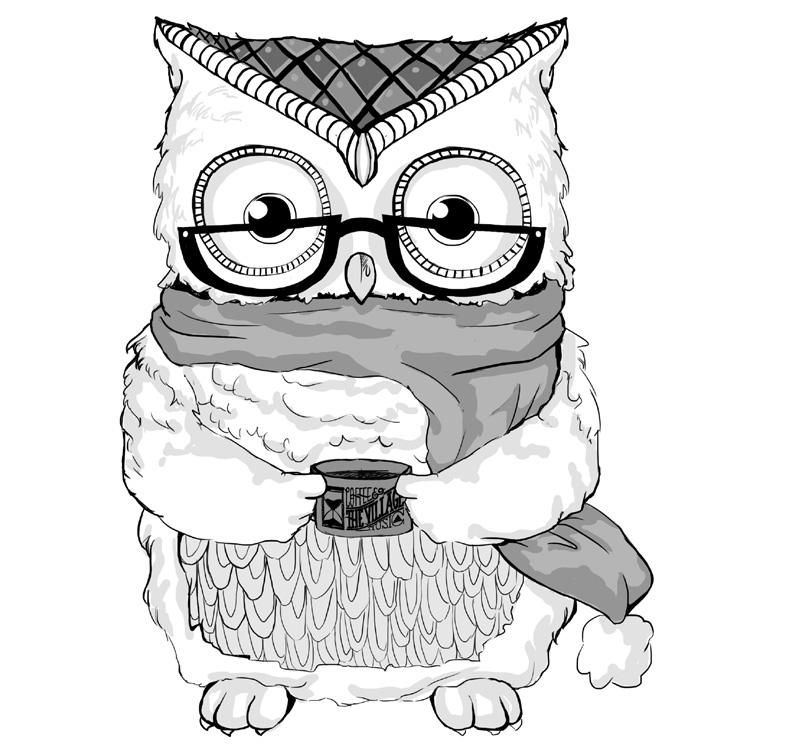
Ivo Dimitrov
“I did it! I finally burst the bubble!” I confidently think to myself as I cycle along the streets of Utrecht. True, going for a coffee with friends doesn’t seem like the biggest accomplishment, but for us first years it’s a big deal. Little did I know that I was going to end up in a world just as weird and closed-off as our own lovely bubble. Welcome to The Village, Utrecht’s one and only hipster nirvana.
As I open the door to this supposedly “relaxing place with a one-of-a-kind atmosphere”, I already sense that something is odd. Why is someone mumbling to disconnected guitar sounds in the background? Why do the walls look like they are falling apart? Who put a huge creepy owl at the counter? Maybe this is how the scary world outside the bubble looks like – I wouldn’t know. I decide not to let my inexperience get the best of me and follow my friends to order coffee.
I look at the small announcement board, which suggests that I should order a LGB33. Now, I’m always in for trying new things, but I’m not sure if I am ready for the hallucinatory effects of whatever substance LGB33 is. The other suggestion of the day is something called The Urban Voodoo Machine. The last time I tried voodoo I ended up hurting myself rather than my ASAP professor, so I decide to skip this as well. In the end, the barista pushes an absolutely regular cappuccino in my hands, though aggressively insisting it is called a flat white. Ah well, if you say so.
We sit on chairs that look unstable on the ever so slightly worn out wooden floor. I guess that’s the price you pay for vintage. My friends insist on using the radiator instead of a table for our coffees. Who needs a table anyway? I am tired of wondering and just follow the instructions: take an Instragram photo, discuss that last vinyl you bought, and stare disinterestedly at a coffee machine used as a flower pot. Before I know it, I am wondering why I am not wearing my skinny jeans and find myself longing for the next Le Guess Who. I feel jealous of the vaguely sexual paintings hanging around – they cost only €250 per piece. I vow to never ever leave this place again. It feels like home now. I wanna stay! Buzz in my head. What’s going on?
Fresh air is all I want after ten minutes inside. Going back to my beloved campus has never seemed like a better idea. Bubble, bubble, why did I ever dare to leave you?
The Village Coffee & Music: Voorstraat 46.
“About a bird”
“My bike got stolen by some junkie…”
“The big bad wolf is coming to town ”
“That the ‘Picture of Dorian Gray’ is going to be amazing this year!”
“We give free pepernoten in the office””
Editors
Sofia Banzhoff
Laura Boerboom
Lisa ten Brinke
Elena Butti
Ivo Dimitrov
Willem van Geel
Marina Lazëri
Klementina Ristovska
Januschka Veldstra
“That someone baked a penis shaped chocolate cake for the Slave Auction”
“Maarten Diederix would still love to receive heaps of emails concerning dysfunctional internet”

“You have to pay 30 euros to leave campus with your car after midnight..”

“The girl next to me has been pregnant for 3 months”
The Boomerang Team 2012|2013:
Editor-in-Chief Klementina Ristovska
Managing Director Elena Butti

Off-Campus Editor & Secretary Marina Lazëri

Campus Editor & Treasurer Willem van Geel


Managing Editor Laura Boerboom


Art and Layout Director Minh Tue Le Ngoc
Layout Designers Emiel Stegeman, Danielle Bovenberg
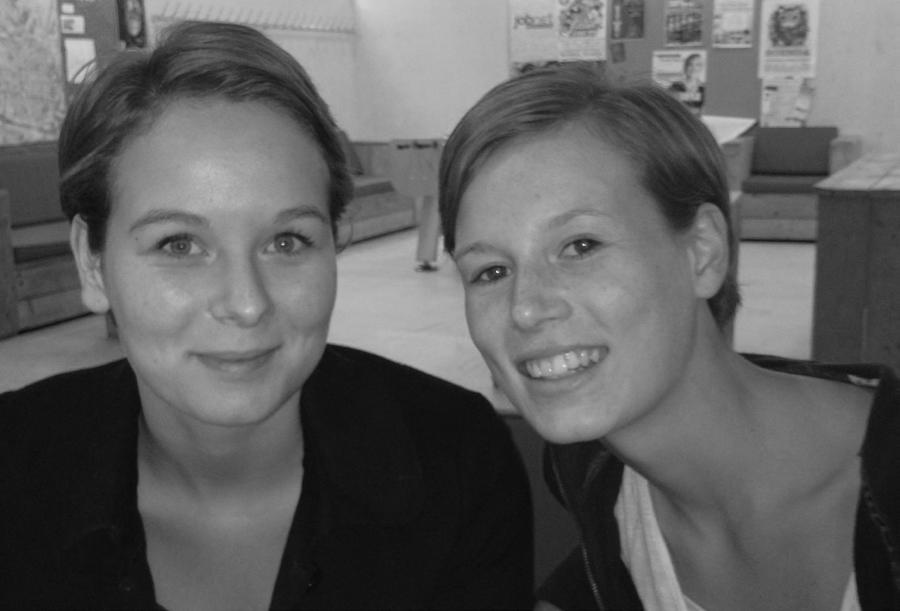
Cartoonists Carlos Granados Martínez, Laurence Herfs
CAO Martijn Scholtemeijer
The Boomerang is now online! Visit, read and comment on ucsaboomerang.wordpress.com
